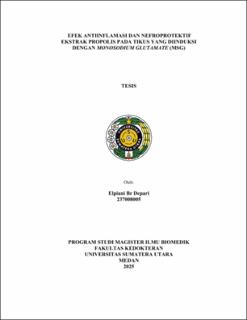| dc.description.abstract | Background: Chronic kidney disease is a global health problem, affecting more than 800 million people and increasing every year. The disease can be triggered by organ inflammation due to excessive use of certain substances such as monosodium glutamate. Monosodium glutamate (MSG), a food flavour enhancer and added to fast food widely. Excessive use of MSG can trigger inflammation and kidney damage. It is important to prevent the effects of excessive MSG use, both through education and supplementation. Propolis, a natural supplement, is well-known to the public and contains many bioactive compounds, has anti-inflammatory effects and protects against organ injury. On this basis, researchers intend to analyze whether propolis can reduce inflammation and protect the kidneys from excessive use of MSG.
Goals: 1) To prove that propolis is able to reduce the levels of NF-кB, TNF-α, IL-1β and IL-6 in the kidneys of rat fed with MSG. 2) To prove whether propolis can reduce the levels of creatinine and serum urea in rat fed with MSG. 3) To prove whether propolis can improve kidneys histopathological abnormalities of rat fed with MSG.
Methods: A total of 36 male Wistar rats were divided into 6 groups, they were negative control group that received standard food + Aquabidest; positive control group that received MSG 30 g/kg food + Aquabidest, placebo group that received MSG 30 g/kg food + glycerol solution, and 3 propolis intervention groups that received MSG 30 g/kg food and propolis at doses of 30 mg, 50 mg and 100 mg/kg rat weight, respectively. Feed and propolis interventions were carried out for 30 days. Blood serum was taken for examination of creatinine and urea levels. Kidneys were taken for NF-кB, TNF-α, IL-1β and IL-6 kidney levels and kidney histopathology test. Test of inflammatory markers was carried out by ELISA by using a standard ELISA kit for rats. The results were then analyzed statistically, changes in the propolis intervention group compared to the positive control group.
Results: The results showed that propolis was able to reduce inflammatory markers NF-кB, TNF-α, IL-1β and IL-6 compared to positive controls (p<0.05), significantly. Increasing the dose increased the ability of propolis to reduce inflammatory markers.
Conclusions: Administration of propolis extract can reduce the levels of inflammatory markers (NF-кB, TNF-α, IL-1β, and IL-6) and improve interstitial inflammation in kidney histopathology. | en_US |


